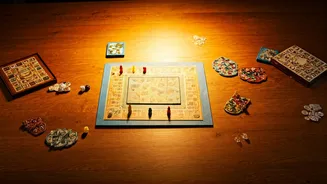Embrace Togetherness
Shared playtime is more than just passing time; it's a foundation for building stronger relationships. When people engage in activities together, they
forge deeper bonds through shared experiences. This collective engagement strengthens the sense of togetherness, creating a supportive environment where individuals feel understood and valued. This is because people share laughs, overcome challenges, and celebrate victories together, which contributes to a more cohesive and happy environment. The practice of participating in activities also cultivates a sense of trust and understanding, as individuals witness each other's strengths and weaknesses. By prioritizing shared playtime, people can enhance the quality of their connections and create a nurturing atmosphere that supports the emotional and social well-being of all involved.
Benefits of Play
The benefits of engaging in shared playtime extend far beyond simple enjoyment. Participating in recreational activities promotes mental and physical health. Playing games or exercising together can elevate mood, alleviate stress, and improve overall well-being. It also fosters creativity and enhances cognitive functions by encouraging people to think outside the box and solve problems. When individuals play together, they improve communication skills, as they have to collaborate and negotiate rules and strategies. Playtime also supports emotional development. It enables people to express themselves freely, manage emotions, and build resilience when facing setbacks. Regular shared playtime can increase feelings of connection and belonging, enhancing overall happiness and life satisfaction, making it an essential aspect of a fulfilling life.
Daily Playtime Ideas
Incorporating playful moments into everyday life does not require extensive planning or elaborate setups. Start with simple activities that easily fit into daily routines. Short bursts of shared laughter, such as telling jokes or sharing funny videos, can be an excellent way to uplift the mood. A quick game of cards during a coffee break is also a great option. Make mealtimes more exciting by having themed dinner nights or engaging in playful conversations. If you want to get more active, consider going for a walk or bike ride together in the evening. Schedule regular playdates or group outings, allowing each participant to look forward to quality time. Even a few minutes of play can make a significant difference. The key is to be present, be engaged, and let the joy of playtime lead the way, creating a lasting impact on happiness and well-being.
Weekend Activities
Weekends present opportunities for more involved and creative playtime experiences. Planning a picnic can be a delightful way to spend a Saturday. Pack some games, snacks, and head to a park. Organize a scavenger hunt around the house or in your local area, encouraging exploration and teamwork. If you're looking for more indoor fun, try a movie marathon featuring everyone's favorite films. Playing board games or card games provides an exciting way to enjoy each other's company while testing your skills. Plan a themed craft session, from painting and drawing to simple DIY projects. Alternatively, explore new interests by visiting a local museum or attending a community event together. These activities offer a break from the routine and promote togetherness, creativity, and lasting memories.
Adapt to Interests
The most effective playtime activities are the ones that resonate with everyone's interests. To create the perfect experience, involve everyone in the planning process and let them express their preferences. Observe what everyone enjoys. Some individuals may love board games and card games, while others may prefer outdoor adventures or creative projects. Tailor activities to suit everyone's unique interests, and this will ensure maximum participation and enjoyment. Adapt activities to accommodate physical limitations or special needs, making sure that everyone can participate comfortably. Incorporate themes or challenges based on current interests. By personalizing playtime to each person's specific interests and preferences, you can ensure that the activities are fun, engaging, and encourage participation, contributing to everyone’s enjoyment and engagement.
Digital Playtime Balance
While digital platforms offer engaging activities, it’s important to strike a balance between digital and in-person playtime. Limit screen time and avoid excessive reliance on digital devices during playtime. Create dedicated times for digital games or online interactions. Encourage interactions that support face-to-face engagements such as group video chats or online collaborative games. Set ground rules for digital device use to ensure that everyone feels comfortable and engaged. Encourage other forms of activities that promote physical activity or creative expression. The focus should be on creating a healthy balance that allows the benefits of digital tools while promoting healthy social interactions and well-being. A balance of these activities can help maintain a more vibrant and fulfilling social life.
Create Lasting Memories
The objective of shared playtime extends beyond momentary enjoyment, it is about creating lasting memories. Take pictures and videos to document these special moments, and establish a digital or physical scrapbook that can be revisited in the future. Involve people in documenting their experiences, encouraging them to write about their favorite activities. Encourage everyone to reflect on what they learned. By revisiting these memories, people strengthen their connection. Regularly revisiting past experiences can also offer a sense of continuity and affirmation that the relationships are important and valued. By putting in place the foundations to capture and cherish these memories, people can create a rich legacy of love, laughter, and connection.














